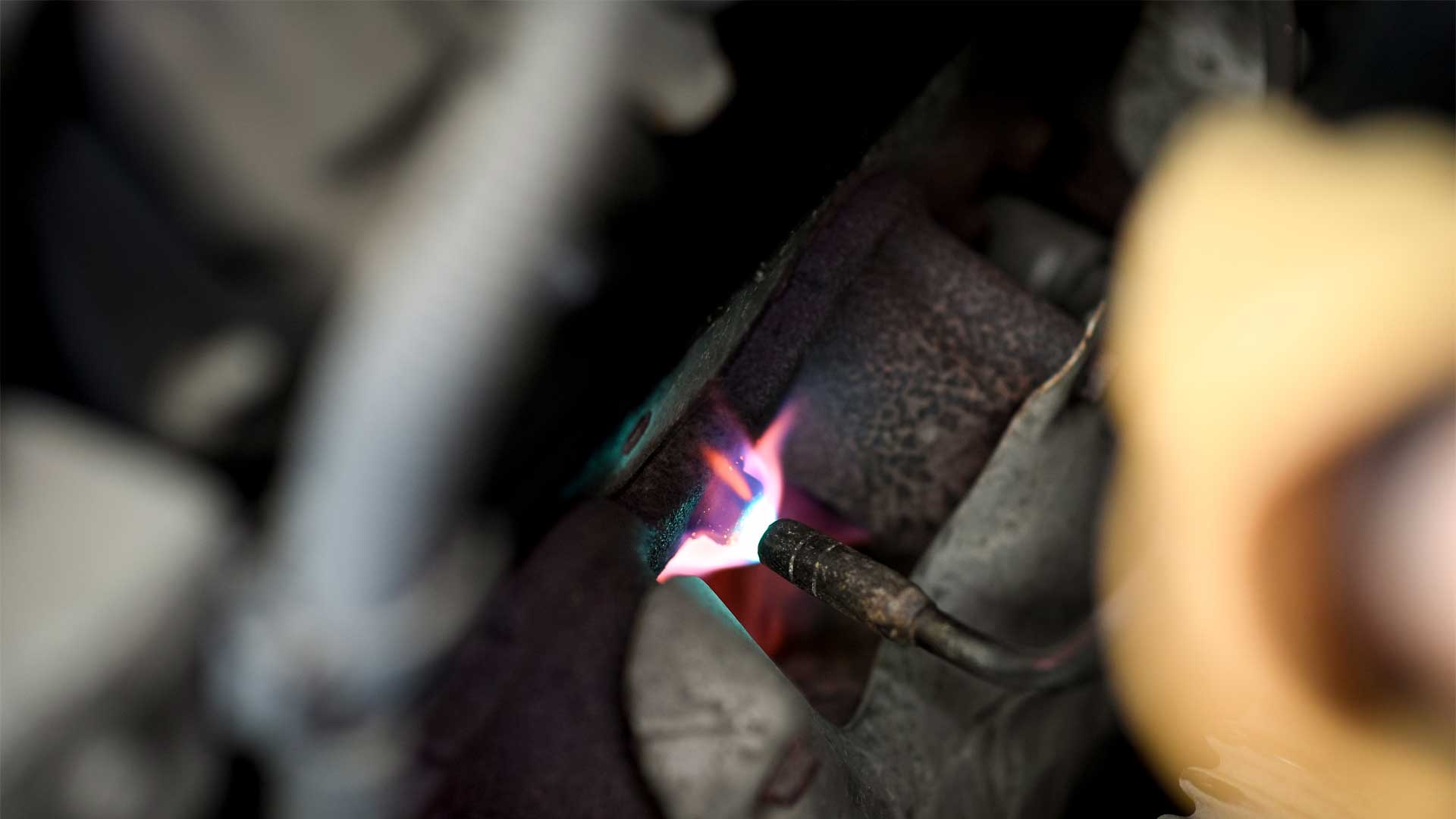The Rust Belt and the Salt Belt may sound similar, and you might even hear them used interchangeably, but they are distinct names that any automotive professional or enthusiast should know. Take a few seconds to get the real story on these terms.

The oxyacetylene torch is the cornerstone of any shop’s torch selection, and for good reason.
Oxyacetylene is the industry standard for heating and cutting with a flame. With some practice and a little know-how, this time-honored tool can handle virtually any torch task your shop may have. If oxyacetylene is so great, why bother looking at anything else?
If you’re a tech, there’s a good chance that you don’t actually own the ‘cety torch that you rely on. That’s the shop’s property in many cases. If you do own your oxyacetylene rig, you’ll know that it isn’t a cheap piece of equipment, and if you rent your acetylene tank, you might have noticed rental prices creeping up, too. Let’s talk about some of these other types of torches, their costs relative to oxyacetylene, and which ones are worth your hard-earned money for your personal toolbox.

Photo: Mike Apice.
Alternative torch options offer a few benefits despite their limitations, and they’re handy to have around for jobs when oxyacetylene is overkill or unnecessarily expensive.
If you haven’t used some of these other torches before, then introductions are in order. Let’s start with compact torches and work up to some larger options.
Good ol’ propane is great for general use and backyard barbeques, but it’s also helpful around the shop for small heating tasks like warming a part before dropping in a new bearing. Small propane torches can also help with finding intake leaks, spiking O2 sensors rich and lean to see switching speeds, and making short work of heat shrink. And when combined with some penetrating fluid, a propane torch flame can spit enough heat to free mildly stuck hardware and smaller fasteners in tight quarters.
$
None. If you can start a lighter or a gas stove, you can use a propane torch.
Excellent
Absolutely. Propane is cheap, easy to use, compact… what’s not to like?
MAPP gas is like plain propane’s aggressive older brother. MAPP bottles hold a blend of fuels for a hotter flame than plain propane.
Note: If somebody tells you “They don’t make MAPP gas anymore”, here’s the deal. The original MAPP gas blend (methylacetylene, propadiene and propane) is no longer bottled in the United States. New bottles contain substitutes, and they are not as powerful as the original MAPP formulation.
MAPP tanks and torch heads are available at most hardware stores, usually right next to the propane selection, but a little MAPP torch produces decent heat for its size. MAPP fuel costs more than propane, but the power is a bit more useful for auto repair jobs. For example, MAPP is better than propane for heating stuck fasteners. In fact, MAPP is hot enough that it can be used for soldering, brazing, and light welding on thin metal, although not often in the auto repair industry. Lightweight and compact, sheer portability is one of MAPP’s biggest advantages. As for disadvantages, you can’t cut with MAPP. It is limited to heating small areas.
You should also know that standard propane torches are not meant to be used with MAPP fuel. Per Bernzomatic, using MAPP in a torch designed for propane can cause premature wear (and void your warranty). Some MAPP torches can use propane, though. Just make sure yours is “dual fuel” approved before threading a MAPP torch onto a propane tank.
$$
None, just like propane
Excellent
Probably. It’s a step up from propane, although plenty of techs get along just fine without MAPP. The “original” formula was definitely worth owning, but that’s ancient history now.
While not really a member of the torch family, induction heaters serve a near-identical purpose: encouraging fasteners to loosen up with some thermal persuasion. When power is applied to the coil at the business end of the tool, the resulting magnetic field causes the stuck nut, bolt head, etc. to heat up rapidly. Of course, this is a flameless process. They’re very useful, but they have a few limitations to consider. First, they only heat metallic parts that fit inside the induction ring. They’re corded, a little unwieldy, and they might not be able to reach targets that could be hit with a flame. Even so, induction heaters are often the ideal tool for dealing with heavily rusted hardware.
$$$
Easy! Put the coil over your target and hit the switch.
Good, although these tools are corded and rather long
Certainly nice to have, especially if you’re in the Rust Belt.
The air-acetylene torch grabs oxygen for combustion right out of the air instead of using oxygen from a tank. Ditching the pure oxygen reduces the flame’s peak power and temperature compared to oxyacetylene, but the torch operates off just one tank, and the flame output is far spicier than propane or MAPP. Also, flame adjustment is easy with only one regulator. Air-acetylene is rarely used in the automotive industry. It’s more of a plumber’s tool, and you can find all the torch parts you need at your local plumbing supply shop.
$$$
One tank, one regulator, one hose. Pretty simple!
Depends on the tank size, really. Plumbers often use the 22-pound “B” tank for a balance of portability and capacity.
Not really. Your shop’s oxyacetylene torch can do everything this torch can do, and far more.
As the name suggests, oxy-propane uses bottled oxygen to enhance propane’s output for a surprisingly useful oxyacetylene alternative. While oxy-propane torches don’t quite reach the peak temperatures of oxyacetylene rigs, they are still very potent. Oxy-propane can heat and cut with plenty of power, and if you’re already familiar with oxyacetylene, the learning curve is not bad at all.
An oxy-propane setup will require Grade T hoses and a propane-specific torch tip. Also, oxy-propane rips through bottled oxygen faster than oxyacetylene, but propane’s lower refill price and greater availability can offset that disadvantage.
$$$
Not great. These bottles should live on a cart, unless you are using one of the compact rigs
Steeper than any other option here unless you’re already familiar with oxyacetylene
Probably not. But if you’re working in a salvage yard or a small, remote shop, your shop’s owner should seriously consider oxy-propane. It’s a great choice for quick and dirty work in the salvage yard.
Do you run any of these oxyacetylene alternatives in your shop? Drop a comment and let us know what tools you trust for hot work.
The articles and other content contained on this site may contain links to third party websites. By clicking them, you consent to Dorman’s Website Use Agreement.
Participation in this forum is subject to Dorman’s Website Terms & Conditions. Please read our Comment Policy before commenting.